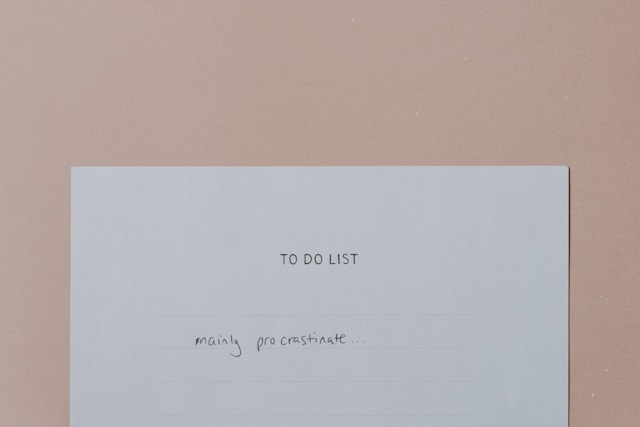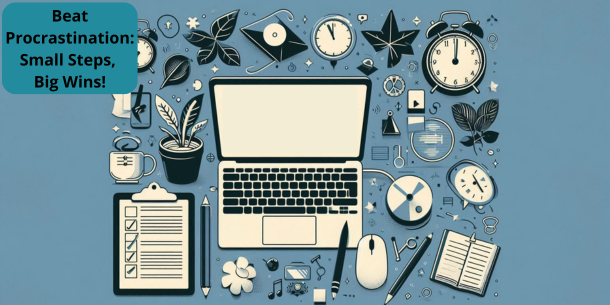If procrastination were an Olympic sport, how many gold medals would you have? I’d probably need a whole display case by now. What is procrastination, and how do you beat it?
Right now, I have been putting off folding laundry, and I also tried making my first YouTube short right before I started writing this post.
And knowing this, unfortunately, does not help me to stop procrastinating.
What Is Procrastination?
So, what is procrastination? According to the Cambridge dictionary, it’s delaying something because it’s unpleasant or boring. Sound familiar? An article on the subject from Wikipedia expands the definition, mentioning that it is a common thing to do. The article also gives some examples of what we tend to procrastinate on. The text also brings up the negative traits of procrastination, such as its negative effect on our productivity and how it is connected to feelings of guilt, inadequacy, and even depression.
Fear is excellent at keeping us stuck, because if you never try, you never fail. This is probably why procrastination is so common. It’s a way of keeping us safe. When we don’t try, we won’t fail, and we won’t be judged for what we try to accomplish. The problem is that we will also never succeed, grow, or maybe reach a potential that we didn’t know that we had. This is why it’s worth trying to beat procrastination – or at least try not to get stuck!
Procrastination, at its core, is a form of protection. Unfortunately, this leads to problems when we keep postponing things we know we want or need to do. Procrastination is a coping mechanism and a way to avoid the stress we associate with certain tasks. The problem is that this mechanism can backfire. While it may relieve stress in the present, it builds more stress over time.

So, is researching about the thing doing the thing? No.
Is learning all that you can about it, doing the thing? No, but it can get you stuck in analysis paralysis.
Is thinking about doing the thing, doing the thing? No, of course not.
The only thing that counts in this case is to do the thing that you avoid doing. And even when we know why we avoid certain things, it can be difficult to do them. For example, if you know that you promised yourself you would do something, it can still be difficult sometimes to go and do it.
Procrastination, People-Pleasing, and Your Goals
Sometimes, having someone else count on us to do something is easier than parts where we keep ourselves accountable. That’s at least my experience. If someone else depends on me, it’s much easier for me to make sure that thing gets done. And this is part of people-pleasing because I don’t want to let the other person down, and I don’t want them to think poorly of me.
It also reflects on me as a person. If I have made a promise to do something, and then don’t do it, then why should that person trust me the next time I promise to do something for them? In this case, people-pleasing helps me push through procrastination. But at what cost?

The problem is that when you set goals for yourself, and don’t do them. The only one that gets hurt in the long run is you. And that is not a small thing. Likewise, if you start to actually do the thing that you’ve been putting off, or you complete something that you’ve been putting off for a long time. You feel a sense of accomplishment. Maybe you even feel proud of yourself for actually doing it.
It doesn’t have to be perfect every time. The truth is it won’t be most of the time. But the fact that you just took the time and did the thing that you promised yourself that you would do.
It counts! Even though no one else cares, you do.
How Can You Beat Procrastination?
So, how do you go from being a pro at procrastination and a medal winner to someone who would come later in that race?
First of all, if you are very ambitious, if someone tells you to lower your standards, they could just as well have told you to stop breathing because it’s almost as easy.
Second of all, if you are ambitious and also have a lot of ideas, this could get you stuck in analysis paralysis. Or make it difficult to decide what to focus on. This will guarantee that you are not doing anything at all. I’ve mentioned some more tips in another post, but I decided to add a few things.
So, how do you beat procrastination? The first thing you need to do is to decide on what is most important. What will have the most impact if you get it done?
The second thing is to create some time for when you will work on whatever you decided in the first step. This is where I often get stuck. I put it on my calendar, and sometimes I still don’t execute on it.

Make It More Pleasant
Often, we procrastinate because what we set out to do is difficult, boring, or a combination of the two. My advice here is the following: what little thing can you do to make this a little bit more pleasant?
Sometimes it could be as simple as putting on some nice music. Sometimes it is setting a timer or promising yourself that you’re just going to work on the task for five minutes. Usually, those five minutes will go by, and sometimes you want to keep at it.
Sometimes you feel fine by just doing five minutes, and that is ok. But those five minutes mean you got started and got at least five minutes of work done on the task.
You may not have finished it, but you started. And that is the most draining part. Getting started is what takes most of the time, energy, and effort. And if you get past that, the rest will be a lot easier.
Eat the Frog
There are different ways to describe this, showing up from different gurus around. Mark Twain once said that:
If it’s your job to eat a frog, it’s best to do it first thing in the morning. And If it’s your job to eat two frogs, it’s best to eat the biggest one first.
While you may not want to eat an actual frog, this translates to taking your most difficult task and doing this the first thing in the morning. Once that’s done, everything else will feel easy.
This may not always feel viable. It may not feel like something you can accomplish each and every time. But sometimes this is good advice.

Small Steps – Huge Difference
Simple things you can do to beat procrastination include:
- Break the task into micro-steps: Start by writing ONE sentence. Then another. What is the smallest step you can take right now that would make a difference and move the needle forward for you?
- Set a five-minute timer: Just start. If you want to keep going, great—if not, you’ve still made progress.
- Remove distractions: Put your phone in another room or block distracting websites.
The problem with procrastination is that we tend to see the whole forest. Instead of individual trees, we just see everything as a big mess. And we don’t know what to do or how to move forward, which in turn makes us stuck and unable to go anywhere.
What Happens When We Beat Procrastination
When we do the thing that was set out to do, we build confidence. And it’s not that we need to be motivated. We need to do the thing, and motivation will follow. I know it sounds backward, but that’s true.
Most of the time, we want to feel inspired, and we want to be aligned with what we want to do. But that is not always the case. Sometimes the plan does not match the kind of energy we need to get the thing done. It looked good on paper when you planned it, but now you’re feeling tired or scatterbrained.
You don’t know where to go next. These are the times when you need to look at what the end goal is and what baby steps you can take.
Your Next Step: Make It Happen!
Procrastination will always try to hold you back—but you don’t have to let it win. There are different ways to beat procrastination. Whether it’s a five-minute start, a small mindset shift, or tackling the biggest “frog” first, every step forward counts. The trick isn’t waiting to feel ready—it’s starting anyway. What’s one thing you can start right now?
I challenge you to take five minutes right now to tackle that thing you’ve been avoiding! Then come back and tell me how it went.
Want more tips on productivity? Check out my other post on Calendar Blocking in Outlook and How This Can Help You Stay Sane!
